Unit 1 Past and Present Grammar——The Present Perfect Tense 课件(共34张PPT)
文档属性
| 名称 | Unit 1 Past and Present Grammar——The Present Perfect Tense 课件(共34张PPT) | 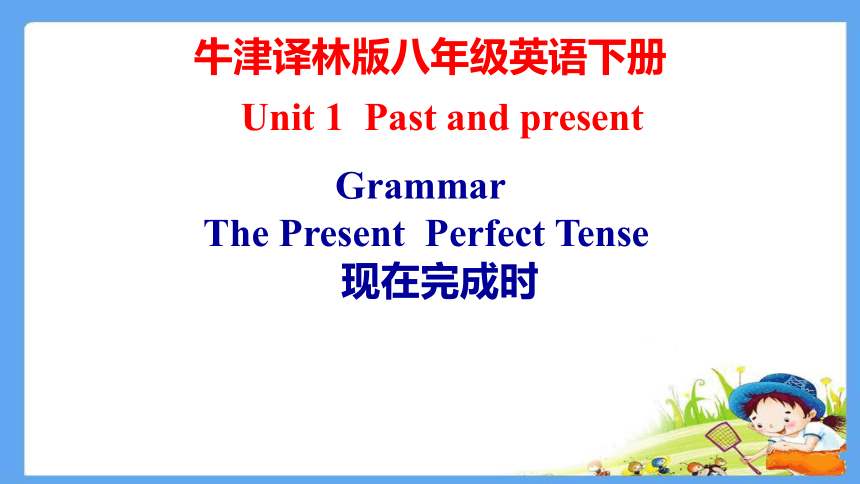 | |
| 格式 | pptx | ||
| 文件大小 | 359.4KB | ||
| 资源类型 | 教案 | ||
| 版本资源 | 牛津译林版 | ||
| 科目 | 英语 | ||
| 更新时间 | 2022-02-20 13:56:45 | ||
图片预览

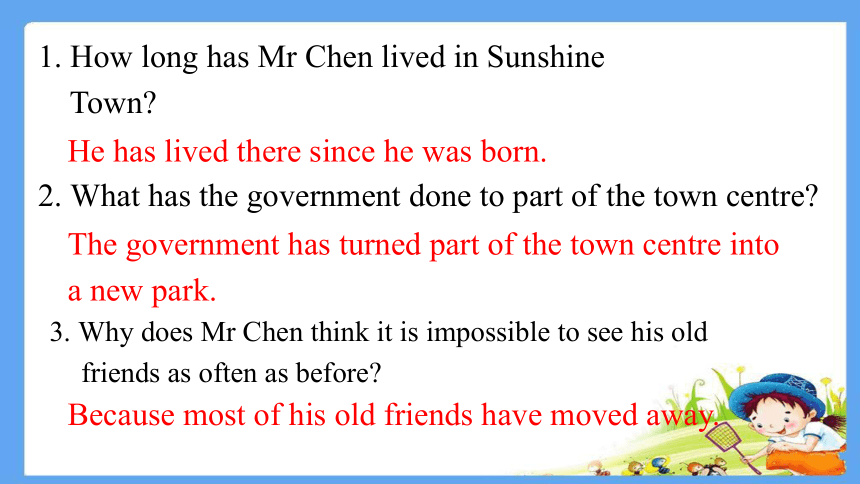

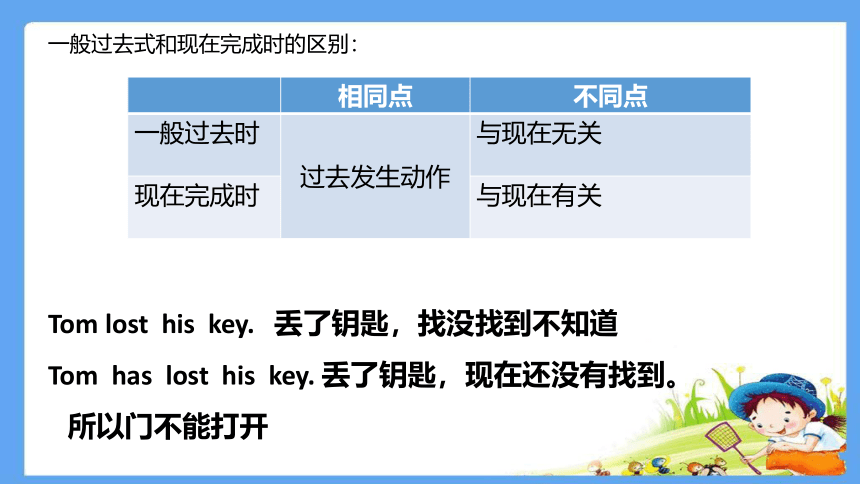
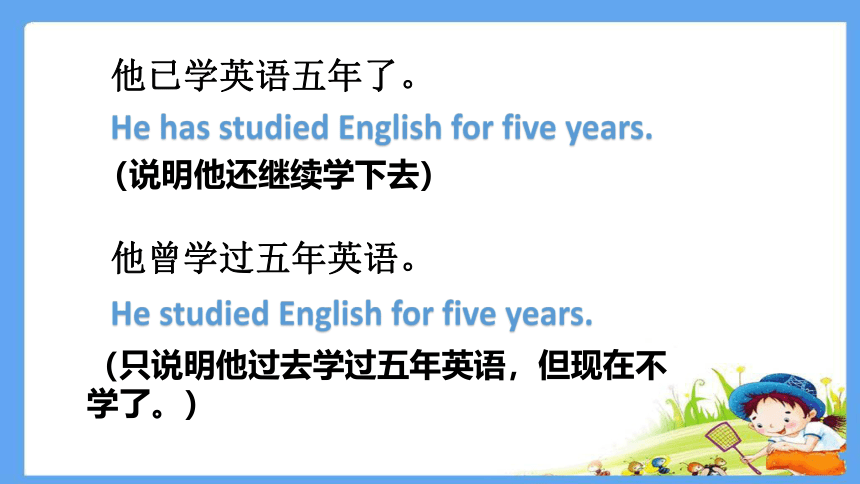
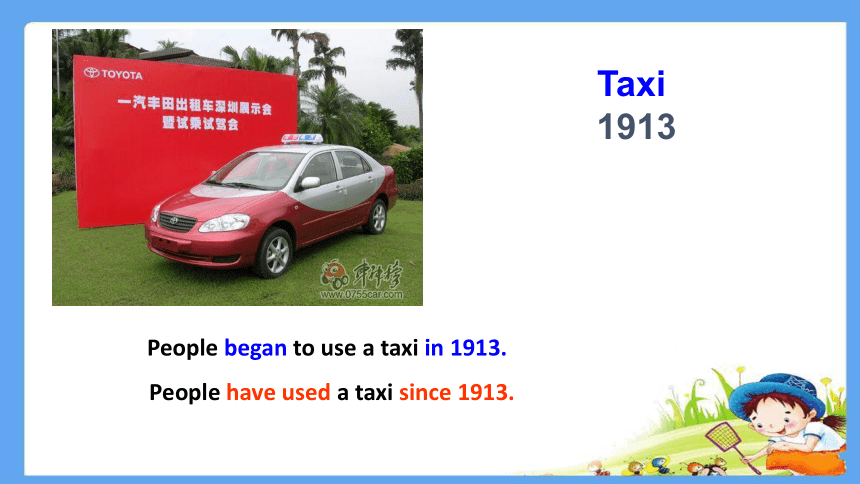
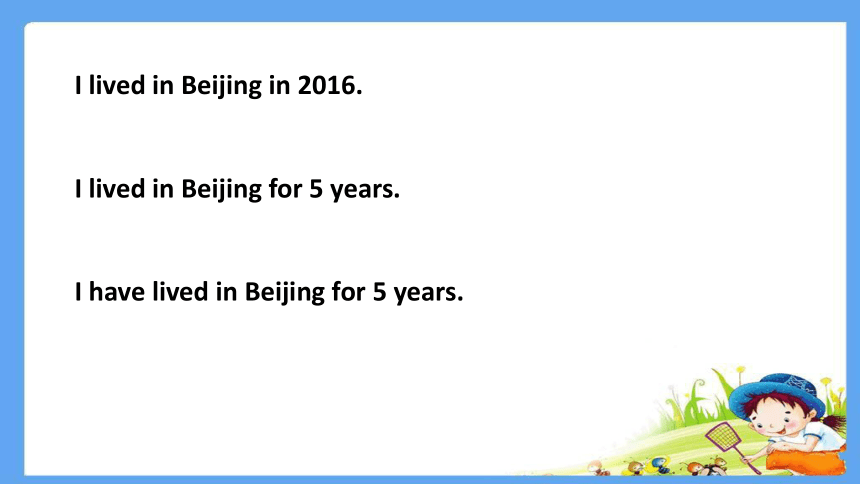
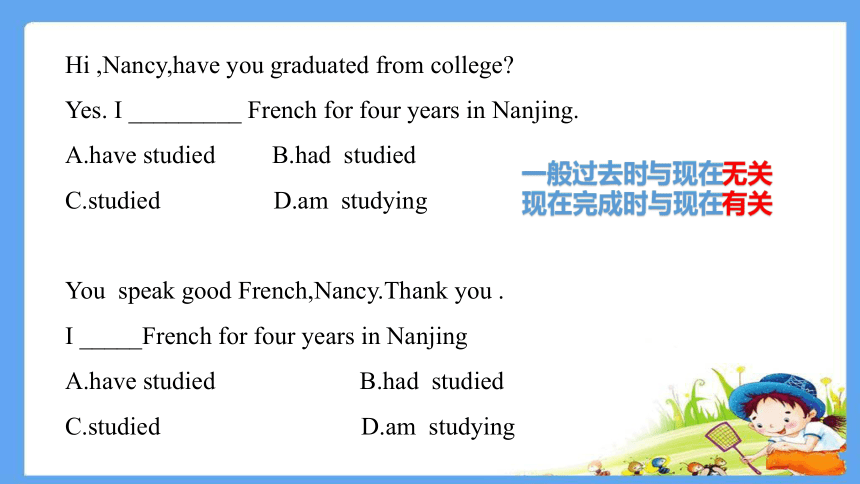
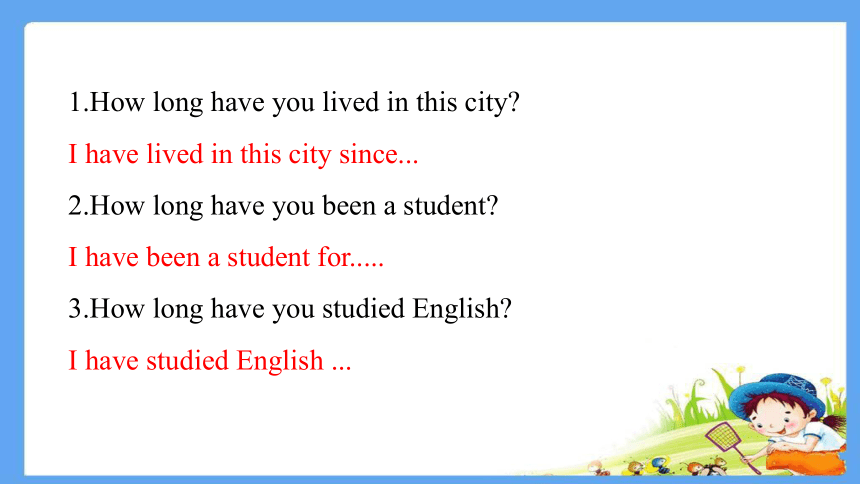
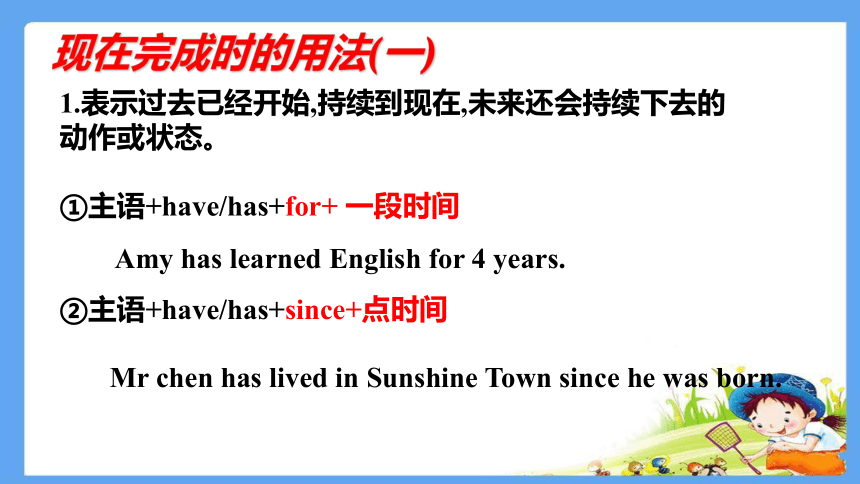
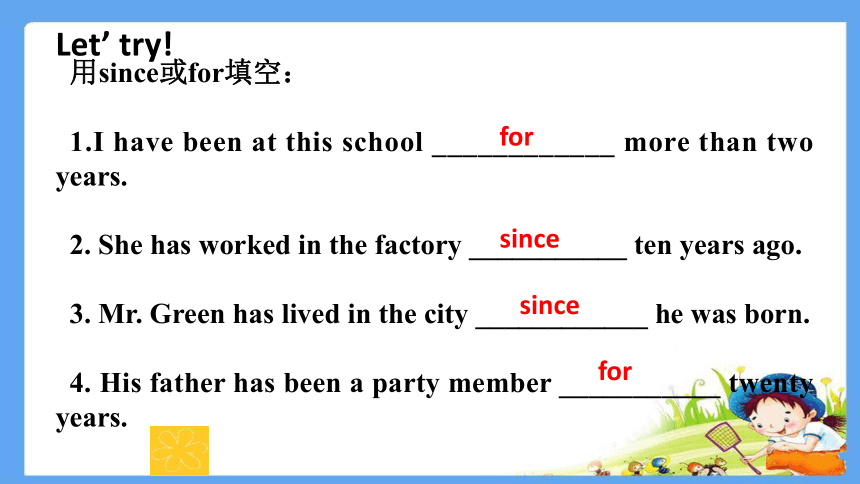

文档简介
(共34张PPT)
牛津译林版八年级英语下册 Unit 1 Past and present
The Present Perfect Tense
现在完成时
Grammar
1. How long has Mr Chen lived in Sunshine
Town
2. What has the government done to part of the town centre
He has lived there since he was born.
The government has turned part of the town centre into a new park.
3. Why does Mr Chen think it is impossible to see his old friends as often as before
Because most of his old friends have moved away.
1.He has lived there since he was born.
2.The government has turned part of the town centre into a new park.
3.Because most of his old friends have moved away.
现在完成时:表示在过去开始、现在还在继续或依然与现在有联系的动作或情况。
结构: 主语+have/has+过去分词
一般过去式和现在完成时的区别:
Tom lost his key. 丢了钥匙,找没找到不知道
Tom has lost his key. 丢了钥匙,现在还没有找到。
所以门不能打开
相同点 不同点
一般过去时 过去发生动作 与现在无关
现在完成时 与现在有关
他已学英语五年了。
He has studied English for five years.
他曾学过五年英语。
He studied English for five years.
(说明他还继续学下去)
(只说明他过去学过五年英语,但现在不学了。)
Taxi
1913
People began to use a taxi in 1913.
People have used a taxi since 1913.
I lived in Beijing in 2016.
I lived in Beijing for 5 years.
I have lived in Beijing for 5 years.
Hi ,Nancy,have you graduated from college
Yes. I _________ French for four years in Nanjing.
A.have studied B.had studied
C.studied D.am studying
You speak good French,Nancy.Thank you .
I _____French for four years in Nanjing
A.have studied B.had studied
C.studied D.am studying
一般过去时与现在无关
现在完成时与现在有关
1.How long have you lived in this city
I have lived in this city since...
2.How long have you been a student
I have been a student for.....
3.How long have you studied English
I have studied English ...
1.表示过去已经开始,持续到现在,未来还会持续下去的
动作或状态。
①主语+have/has+for+ 一段时间
②主语+have/has+since+点时间
Mr chen has lived in Sunshine Town since he was born.
现在完成时的用法(一)
Amy has learned English for 4 years.
Let’ try!
用since或for填空:
1.I have been at this school ____________ more than two years.
2. She has worked in the factory ___________ ten years ago.
3. Mr. Green has lived in the city ____________ he was born.
4. His father has been a party member ___________ twenty years.
for
for
since
since
动作发生在过去,对现在有影响或与现在有联系;
现在完成时的用法(二)
1.Eddie has eaten Hobo’s food.
(Eddie ate the food and now Hobo has nothing to eat.)
2. Let’s watch TV.
Sorry.We haven’t finished our homework yet.
(我们还没有完成作业呢,所以不能看电视)
3. Your English is so good.
Thanks.I have studied English since I was 4 years old.
(因为我从4岁学英语,所以现在我的英语很好)
3. 表示到目前为止一个动作做了多少次。
e.g. My mother ____________ (read)the book twice.
I ________________ (watched)the film many times.
现在完成时的用法(三)
has read
have watched
in the past/ last few days(在过去/最近的几年里),so far, 迄今为止
现在完成时的时间状语
用正确时态填空
Hurry up! Lunch ________already _________(begin).
________ he ever _________(ride) a bike
Liming ________(hurt) his arm last week. He ________ already ________(stay) in bed for five days.
Yesterday, she ________(buy) one book in the bookshop. She ___________ (not read) it since then.
hurt
has
begun
Has
ridden
has
stayed
bought
hasn’t read
I ________already _________(lose) my pen. I_________(buy) it two days ago.
He ___________ (wait) at the bus stop for an hour. He is impatient.
I ________________ (not finish) the work yet.
___________ you ________ (know) him since then
has waited
haven’t finished
Have
known
have lost
bought
I / You/ We / They have arrived.
He / She / It has 肯定句
主语 + have/has+动词的过去分词
I / You/ We / They have not
arrived.
He / She / It has have not = haven’t
has not = hasn’t
(2)否定句
主语 + have/has not +动词的过去分词
Have I / you/ we / they arrived
Has he / she / it Yes, I / you/ we / they have.
he / she / it has.
No, I / you/ we / they haven’t.
he / she / it hasn’t.
(3)一般疑问句及回答
Have/Has + 主语 + 动词的过去分词
Yes,主语+have/has.
No,主语+haven’t/ hasn’t .
Let’s practise
Lucy has finished her homework.
(一般疑问句,并做肯定和否定回答)
_____ Lucy ________ her homework?
Yes,______ ______.
No, ______ _______.
Lucy ___ _______ finished her homework.
Has
finished
she
has
she
hasn’t.
has not
Let’s practise
We have cleaned the classroom.
(一般疑问句,并做肯定和否定回答)
_____ you ________ your classroom?
Yes,______ ______.
No, ______ _______.
We ____ _____ cleaned the classroom.
Have
cleaned
we
have
we
haven’t.
has not
1.He has opened the door.
2.The students haven’t changed a lot.
3.Have they carried the heavy boxes
4.Has she stopped a taxi
过去分词(P.P.)
Group work
仔细观察,总结出过去分词的构成方法。
visit
repair
live
move
try
study
fit
plan
visited
repaired
lived
moved
tried
studied
fitted
planned
Base form Past participle
Base form Past participle
hit
put
meet
make
sell
give
write
think
hit
put
met
made
sold
given
written
thought
1.Most verbs open→ opened
2.Verbs ending in -e change → changed
3.Verbs ending in a consonant + y carry → carried
4.Short verbs ending in a vowel + a consonant stop → stopped
+ed
+d
-y +ied
double the
consonant +ed
rules :动词的过去分词的构成
No change come→come hurt → hurt
Change the vowel hold → held win → won
Change the consonant lend→lent
build → built
Change the vowel(s) and the consonant(s) catch →caught keep→ kept forget→ forgotten
tell→ told
Others be→ been have→ had
fall→ fallen fly→ flown
draw→ drawn
see→ seen
见课本第122.123页。
1. borrow
2. hope
3. make
4. get
5. plan
6. cry
7. send
8. watch
9. say
10. grow
11. hit
12. enjoy
borrowed
hoped
made
got
planned
cried
sent
watched
said
grown
hit
enjoyed
A
Mr Wu wants the students to practice using the present perfect tense. Help them write the past participles of the verbs below.
A short test
用现在完成时完成下列句子: (p 14)
1.They ______________(finish) their homework already.
2. John _______ never _______ (visit) China.
3. Mr Li ______________(repair) over ten bicycles
since Monday.
4. We ________________(not see) each other for years.
5. My parents ______________(not come) back yet.
6. Our teacher _____________(teach) us a lot about the
history of China recently(最近,进来).
have finished
has visited
has repaired
haven’t seen
haven’t come
has taught
Millie: (1)_____ you ______(see) any films recently, Sandy
Sandy: No, I haven’t. What about you
Millie: I (2)______ (see) one last Saturday. Sandy: What’s it about
Millie: It’s about the changes in Beijing over the past century.
From the film, I (3)______________(learn) more about
Beijing’s past and present.
Sandy: Oh, I think I (4)__________(hear) about the film. Do you
plan to see it again Millie: Yes, I’d like to
Have seen
saw__
have learnt
have heard
补充
现在完成时的时间副词和时间短语:
1. already:肯定句,
yet:否定句和 疑问句。
如: We have already finished our homework.
我们已完成作业了。
They haven't finished their homework yet.
他们还没有完成作业。
注意:当在肯定陈述句中含有already或just 时,在转换成否定句或疑问句时,要把句中的already 或just 去掉,在句末加上yet.
I haven’t seen the film yet.
● I have done my homework already.
I haven’t done my homework yet.
● Mother has just cleaned the house.
Mother hasn’t cleaned the house yet.
● I have seen the film already.
- I have never been to the Great Wall.
我从未去过长城。
ever :曾经
never:从未
多用于否定或疑问句
如: - Have you ever been to the Great Wall
你曾经去过长城吗
He has just eaten ten apples.
他刚吃完十个苹果。
3. just:刚刚,刚才
如: I have just seen her, but I don’t know
where she is now .
我刚看见她,但我不知道她现在在哪。
与already, just, yet, ever, never, before(句末)等连用.
I ________ (do) my homework already.
He _____________(not finished) his homework yet.
____you ever _____(be) to Beijing
We ______ never ______ (see) such an exciting match before.
Mother _____ just _______(clean) the house. Please don’t come in.
They _________________(practice) this dialogue twice.
have done
has not finished
Have
been
have
seen
has
cleaned
have practiced
牛津译林版八年级英语下册 Unit 1 Past and present
The Present Perfect Tense
现在完成时
Grammar
1. How long has Mr Chen lived in Sunshine
Town
2. What has the government done to part of the town centre
He has lived there since he was born.
The government has turned part of the town centre into a new park.
3. Why does Mr Chen think it is impossible to see his old friends as often as before
Because most of his old friends have moved away.
1.He has lived there since he was born.
2.The government has turned part of the town centre into a new park.
3.Because most of his old friends have moved away.
现在完成时:表示在过去开始、现在还在继续或依然与现在有联系的动作或情况。
结构: 主语+have/has+过去分词
一般过去式和现在完成时的区别:
Tom lost his key. 丢了钥匙,找没找到不知道
Tom has lost his key. 丢了钥匙,现在还没有找到。
所以门不能打开
相同点 不同点
一般过去时 过去发生动作 与现在无关
现在完成时 与现在有关
他已学英语五年了。
He has studied English for five years.
他曾学过五年英语。
He studied English for five years.
(说明他还继续学下去)
(只说明他过去学过五年英语,但现在不学了。)
Taxi
1913
People began to use a taxi in 1913.
People have used a taxi since 1913.
I lived in Beijing in 2016.
I lived in Beijing for 5 years.
I have lived in Beijing for 5 years.
Hi ,Nancy,have you graduated from college
Yes. I _________ French for four years in Nanjing.
A.have studied B.had studied
C.studied D.am studying
You speak good French,Nancy.Thank you .
I _____French for four years in Nanjing
A.have studied B.had studied
C.studied D.am studying
一般过去时与现在无关
现在完成时与现在有关
1.How long have you lived in this city
I have lived in this city since...
2.How long have you been a student
I have been a student for.....
3.How long have you studied English
I have studied English ...
1.表示过去已经开始,持续到现在,未来还会持续下去的
动作或状态。
①主语+have/has+for+ 一段时间
②主语+have/has+since+点时间
Mr chen has lived in Sunshine Town since he was born.
现在完成时的用法(一)
Amy has learned English for 4 years.
Let’ try!
用since或for填空:
1.I have been at this school ____________ more than two years.
2. She has worked in the factory ___________ ten years ago.
3. Mr. Green has lived in the city ____________ he was born.
4. His father has been a party member ___________ twenty years.
for
for
since
since
动作发生在过去,对现在有影响或与现在有联系;
现在完成时的用法(二)
1.Eddie has eaten Hobo’s food.
(Eddie ate the food and now Hobo has nothing to eat.)
2. Let’s watch TV.
Sorry.We haven’t finished our homework yet.
(我们还没有完成作业呢,所以不能看电视)
3. Your English is so good.
Thanks.I have studied English since I was 4 years old.
(因为我从4岁学英语,所以现在我的英语很好)
3. 表示到目前为止一个动作做了多少次。
e.g. My mother ____________ (read)the book twice.
I ________________ (watched)the film many times.
现在完成时的用法(三)
has read
have watched
in the past/ last few days(在过去/最近的几年里),so far, 迄今为止
现在完成时的时间状语
用正确时态填空
Hurry up! Lunch ________already _________(begin).
________ he ever _________(ride) a bike
Liming ________(hurt) his arm last week. He ________ already ________(stay) in bed for five days.
Yesterday, she ________(buy) one book in the bookshop. She ___________ (not read) it since then.
hurt
has
begun
Has
ridden
has
stayed
bought
hasn’t read
I ________already _________(lose) my pen. I_________(buy) it two days ago.
He ___________ (wait) at the bus stop for an hour. He is impatient.
I ________________ (not finish) the work yet.
___________ you ________ (know) him since then
has waited
haven’t finished
Have
known
have lost
bought
I / You/ We / They have arrived.
He / She / It has 肯定句
主语 + have/has+动词的过去分词
I / You/ We / They have not
arrived.
He / She / It has have not = haven’t
has not = hasn’t
(2)否定句
主语 + have/has not +动词的过去分词
Have I / you/ we / they arrived
Has he / she / it Yes, I / you/ we / they have.
he / she / it has.
No, I / you/ we / they haven’t.
he / she / it hasn’t.
(3)一般疑问句及回答
Have/Has + 主语 + 动词的过去分词
Yes,主语+have/has.
No,主语+haven’t/ hasn’t .
Let’s practise
Lucy has finished her homework.
(一般疑问句,并做肯定和否定回答)
_____ Lucy ________ her homework?
Yes,______ ______.
No, ______ _______.
Lucy ___ _______ finished her homework.
Has
finished
she
has
she
hasn’t.
has not
Let’s practise
We have cleaned the classroom.
(一般疑问句,并做肯定和否定回答)
_____ you ________ your classroom?
Yes,______ ______.
No, ______ _______.
We ____ _____ cleaned the classroom.
Have
cleaned
we
have
we
haven’t.
has not
1.He has opened the door.
2.The students haven’t changed a lot.
3.Have they carried the heavy boxes
4.Has she stopped a taxi
过去分词(P.P.)
Group work
仔细观察,总结出过去分词的构成方法。
visit
repair
live
move
try
study
fit
plan
visited
repaired
lived
moved
tried
studied
fitted
planned
Base form Past participle
Base form Past participle
hit
put
meet
make
sell
give
write
think
hit
put
met
made
sold
given
written
thought
1.Most verbs open→ opened
2.Verbs ending in -e change → changed
3.Verbs ending in a consonant + y carry → carried
4.Short verbs ending in a vowel + a consonant stop → stopped
+ed
+d
-y +ied
double the
consonant +ed
rules :动词的过去分词的构成
No change come→come hurt → hurt
Change the vowel hold → held win → won
Change the consonant lend→lent
build → built
Change the vowel(s) and the consonant(s) catch →caught keep→ kept forget→ forgotten
tell→ told
Others be→ been have→ had
fall→ fallen fly→ flown
draw→ drawn
see→ seen
见课本第122.123页。
1. borrow
2. hope
3. make
4. get
5. plan
6. cry
7. send
8. watch
9. say
10. grow
11. hit
12. enjoy
borrowed
hoped
made
got
planned
cried
sent
watched
said
grown
hit
enjoyed
A
Mr Wu wants the students to practice using the present perfect tense. Help them write the past participles of the verbs below.
A short test
用现在完成时完成下列句子: (p 14)
1.They ______________(finish) their homework already.
2. John _______ never _______ (visit) China.
3. Mr Li ______________(repair) over ten bicycles
since Monday.
4. We ________________(not see) each other for years.
5. My parents ______________(not come) back yet.
6. Our teacher _____________(teach) us a lot about the
history of China recently(最近,进来).
have finished
has visited
has repaired
haven’t seen
haven’t come
has taught
Millie: (1)_____ you ______(see) any films recently, Sandy
Sandy: No, I haven’t. What about you
Millie: I (2)______ (see) one last Saturday. Sandy: What’s it about
Millie: It’s about the changes in Beijing over the past century.
From the film, I (3)______________(learn) more about
Beijing’s past and present.
Sandy: Oh, I think I (4)__________(hear) about the film. Do you
plan to see it again Millie: Yes, I’d like to
Have seen
saw__
have learnt
have heard
补充
现在完成时的时间副词和时间短语:
1. already:肯定句,
yet:否定句和 疑问句。
如: We have already finished our homework.
我们已完成作业了。
They haven't finished their homework yet.
他们还没有完成作业。
注意:当在肯定陈述句中含有already或just 时,在转换成否定句或疑问句时,要把句中的already 或just 去掉,在句末加上yet.
I haven’t seen the film yet.
● I have done my homework already.
I haven’t done my homework yet.
● Mother has just cleaned the house.
Mother hasn’t cleaned the house yet.
● I have seen the film already.
- I have never been to the Great Wall.
我从未去过长城。
ever :曾经
never:从未
多用于否定或疑问句
如: - Have you ever been to the Great Wall
你曾经去过长城吗
He has just eaten ten apples.
他刚吃完十个苹果。
3. just:刚刚,刚才
如: I have just seen her, but I don’t know
where she is now .
我刚看见她,但我不知道她现在在哪。
与already, just, yet, ever, never, before(句末)等连用.
I ________ (do) my homework already.
He _____________(not finished) his homework yet.
____you ever _____(be) to Beijing
We ______ never ______ (see) such an exciting match before.
Mother _____ just _______(clean) the house. Please don’t come in.
They _________________(practice) this dialogue twice.
have done
has not finished
Have
been
have
seen
has
cleaned
have practiced
